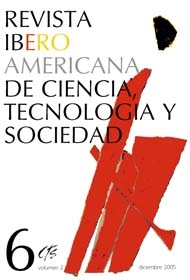Citizenship, Knowledge, Science and STS Education
Toward “New” Epistemological Dimensions
DOI:
https://doi.org/10.52712/issn.1850-0013-994Keywords:
knowledge society, “civilizing” science, “scientifying” citizenship, STS educationAbstract
In a society increasingly based on the intensive use of knowledge and at a time when the post-modern discourse focuses on the de-construction of liberal citizenship and favors the construction of “new” dimensions of citizenship, a new social, technological matrix of science is surfacing, cutting with the positivist paradigm that has underlain modern science and citizenship. When techno-science has become the object of social conflict and political debate and when “civilizing” science and “scientifying” citizenship are conditions for promoting a less arrogant science and a more democratic citizenship, STS education arises as a hope. The construction of a cultural, critical and active citizenship requires as its epistemological strategy STS conceptualizations and rationalities that, before a potent cognitive force – the solidarity of knowledge – repositions being through knowing.
Downloads
References
BECK, U. (1992): Risk society: toward a new modernity, Londres, Newbury. BLOCH, E. (1995): The principle of hope, Cambridge, MIT Press.
CALHOUM, G. (1994): Social theory and the politics of identity, Oxford, Blackwell. CASTELLS, M. (2003): O poder da identidade, Lisboa, Gulbenkian.
DUCLOS, D. (1995): “O mundo científico e os problemas do ambiente”, M. Beaud et al. (eds.) Estado do ambiente no mundo, Lisboa, Instituto Piaget, pp 191-195.
GIDDENS, A. (1991): Modernity and self-identity, Stanford, University Press. HAARSCHER, G. (1997): Filosofia dos direitos do homem, Lisboa, Instituto Piaget. HALDANE, J. (1943): Science and everyday life, Harmondsworth, Penguin.
IRWIN, A. (1998): Ciência cidadã, Lisboa, Instituto Piaget.
JONAS, H. (1993): Le principe responsabilité, Paris, CERF.
LÓPEZ CEREZO, J. (2004): “Aprender participando: Nuevas realidades sociales y nuevos retos de la educación CTS”, III Seminário Ibérico CTS no Ensino das Ciencias, Universidade de Aveiro.
MARSHALL, T. (1950): Citizenship and social class, Cambridge, University Press.
REIGNER, A. (2003): “Uma nova racionalidade para a ciência?”, in B. Santos (ed). Conhecimento prudente para uma vida decente, Porto, Afrontamento.
SANTOS, B. (2003): Conhecimento prudente para uma vida decente, Porto , Afrontamento.
SANTOS, B. (2000): A crítica da razão indolente, Porto, Afrontamento.
SANTOS, B. (1989): Introdução a uma ciência pós-moderna, Porto, Afrontamento.
SANTOS, M.E. (2005a): Que educação? Para que cidadania? Em que escola? (Tomo I), Lisboa, Santos Edu.
SANTOS, M.E. (2005b): Que educação? Para que cidadania? Em que escola? (Tomo II), Lisboa, Santos Edu.
SANTOS, M.E. (2001): A cidadania na “voz” dos manuais escolares. O que temos? O que queremos?, Lisboa, Horizonte.
SANTOS, M.E. (2000): “Reflexos do ´ethos´ da ciência actual na concepção CTS de ensino das ciência”, in I. Martins (ed) O movimento CTS na Península Ibérica,Aveiro, Universidade de Aveiro, pp. 183-205.
SANTOS, M.E. (1999): Desafios pedagógicos para o século XXI, Lisboa, Horizonte.
SANTOS, M.E. (1998): Mudança conceptual na sala de aula, (2ª ed.), Lisboa, Horizonte.
TEDESCO, J. (2001): “La educación y la construcción de la democracia en la sociedad del conocimiento”, CNE, Educação, competitividade e cidadania, Lisboa, CNE.
TOULMIN, S. (2001): Return to reason, Cambridge, University Press.
TOURAINE, A. (1995): «La formation du sujet», Dubet e Wierviorka (eds) Penser le sujet, Paris, Fayard, pp. 21-46.
WILKINS, C. (1999): “Making good citizens”, Oxford Review of Education, 25 (1 e 2), 217-230.
Downloads
Published
How to Cite
Issue
Section
License
Copyright (c) 2025 CC Attribution 4.0

This work is licensed under a Creative Commons Attribution 4.0 International License.
All CTS's issues and academic articles are under a CC-BY license.
Since 2007, CTS has provided open and free access to all its contents, including the complete archive of its quarterly edition and the different products presented in its electronic platform. This decision is based on the belief that offering free access to published materials helps to build a greater and better exchange of knowledge.
In turn, for the quarterly edition, CTS allows institutional and thematic repositories, as well as personal web pages, to self-archive articles in their post-print or editorial version, immediately after the publication of the final version of each issue and under the condition that a link to the original source will be incorporated into the self-archive.











